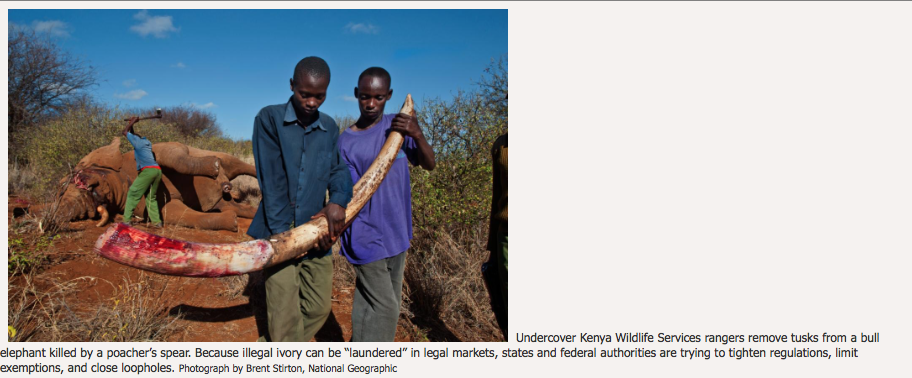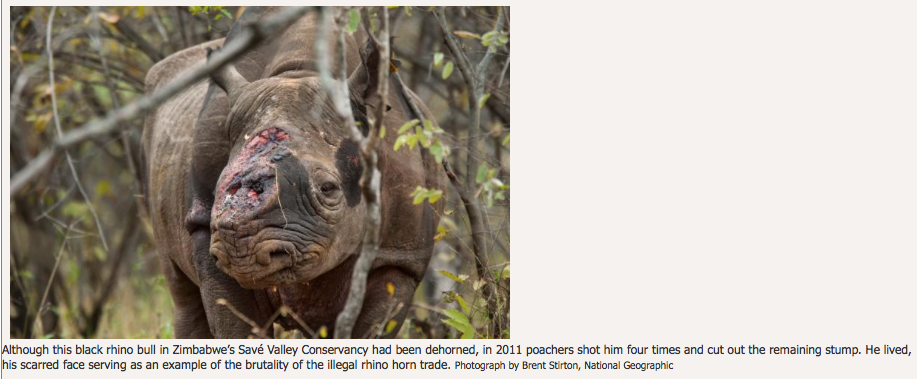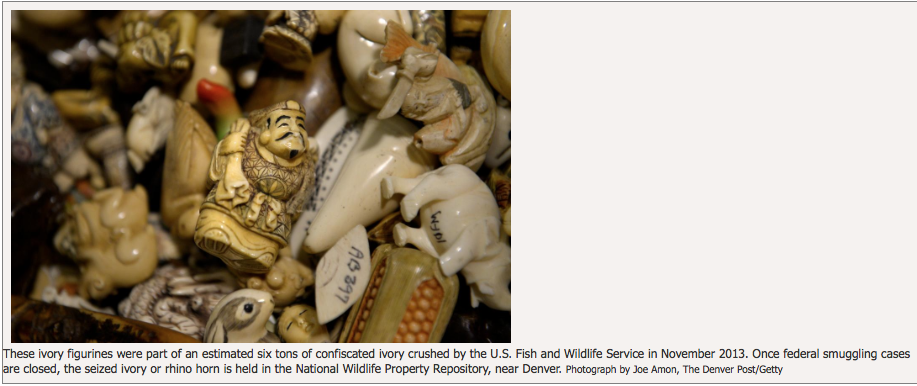National Geographic: Citizens Spur States to Ban Trade in Ivory and Rhino Horn (2)
First posted on 2015-04-11

Citizens Spur States to Ban Trade in Ivory and Rhino Horn
From Vermont to California, grassroots efforts drive state actions to protect elephants and rhinos.
SHELBURNE, Vermont—”When you think things need to change, you have the power to make it happen,” Ashley McAvey, homegrown elephant activist and mother of two, told students recently at Endeavour Middle School in Shelburne, Vermont.
McAvey is the driving force behind Vermont’s proposed legislation (H. 297) to ban sales of elephant ivory and rhino horn in the state. She’ll be giving testimony at the April 8 hearing on the bill before the state’s House Committee on Fish, Wildlife and Water Resources.
“Federal laws restrict the import, export, and interstate sale of ivory,” she said, “but they don’t regulate intrastate ivory sales adequately, and they also allow the continued sale of certain ivory, like antiques.”
McAvey’s efforts are part of a larger trend, in which 25 states have considered or are now considering legislation to restrict ivory and rhino horn sales within their borders.
Two states, New Jersey and New York, have passed such laws. Bills are currently before the legislature in ten others: Arkansas, California, Connecticut, Florida, Illinois, Massachusetts, Nevada, Oregon, Rhode Island, and Vermont. Seven more states—Colorado, Delaware, Georgia, Kentucky, Missouri, Pennsylvania, and Texas—as well as the District of Columbia—are also considering taking action.
In six other states—Hawaii, Iowa, Maryland, Oklahoma, Virginia, and Washington—similar bills have died recently, largely because opponents weakened them significantly. Their champions decided to try again next year rather than accept less effective bills now.
SOURCES: Elephants DC, Wildlife Conservation Society, Born Free USA
The groundswell of state action shows that an issue long thought of as the responsibility of national governments and international organizations is becoming more grassroots and personal.
In Vermont, McAvey spurred Representatives Kurt Wright (Republican) and Joan Lenes (Democrat) to co-sponsor H. 297.
“Ashley showed me what’s been happening to elephants, how bad it is, and how much this is needed,” Wright said. “She made me passionate about the issue.”
“Many in the legislature will roll their eyes at this, given other priorities,” Lenes warned. “But it doesn’t matter that we have all these other issues on our plates. This needs to be on our plates as well.”
“The ivory poaching and trafficking crisis is a complex problem that requires action on multiple levels to ensure that commercial trade doesn’t contribute to the slaughter of elephants in the wild,” said U.S. Fish and Wildlife Service Director Dan Ashe.
“As we work to make it harder for criminals to launder illegal ivory into international and interstate commercial trade, it’s encouraging to see states taking action within their own borders.”
Flaws of the Legal Ivory Market
A Natural Resources Defense Council study on elephant ivory trafficking in California found that the legal market masks illegal activity.
The study reported that as much as 90 percent of ivory for sale in Los Angeles and 80 percent in San Francisco is likely illegal under existing California law. (State lawmakers are now considering Assembly Bill 96, which reduces or eliminates exceptions, and a statewide poll released March 9 shows support for this by more than a ten-to-one margin.)
Meanwhile, recent federal cases of illicit ivory and rhino horn masquerading as antiques underscore the problem.
In 2014 Philadelphia art store owner Victor Gordon received a 30-month prison sentence for smuggling more than one ton of African elephant ivory. He circumvented regulations by staining the items and falsifying receipts to make the ivory appear older than it was.
Zhifei Li, who owned an antiques shop in China, was arrested in January 2013 for masterminding an operation that used three U.S. antique dealers in New York and Texas to smuggle $4.6 million of ivory carvings and rhino horn to China by way of Hong Kong.

New York (essentially, the New York City-New Jersey metropolitan area), California, and Hawaii are reportedly the top three U.S. markets for illicit ivory. Both New York and New Jersey passed ivory trade bills in 2014.
“If we can deal with this issue in those states, it will have a significant impact,” said John Calvelli, the Wildlife Conservation Society’s executive vice president for public affairs.
Other states, such as Vermont, could readily feed into larger markets. “We don’t want other states to become laundering points,” said Adam Roberts, chief executive officer of Born Free USA, a nonprofit organization that advocates an ivory trade ban blanketing the country.
McAvey too says the only answer is such a ban. “I feel the whole reason we’re here is because of exemptions and loopholes: To have any permission of the trade opens the door for abuse.”
Why the States Matter
State initiatives reinforce recent national-level actions on wildlife trafficking, including the National Strategy for Combating Wildlife Trafficking and the tightening of federal ivory trade rules (FWS Director’s Order 210).
Currently, domestic commerce of African elephant ivory in the U.S. is governed by 50 CFR 23.55, the “use after import” regulations that implement the Convention on International Trade in Endangered Species of Wild Fauna and Flora (CITES).
These apply to both intrastate and interstate commerce and prohibit sales unless the seller demonstrates that the ivory was imported before 1990 (when the African elephant was listed in CITES Appendix I) or has a special CITES certificate showing that the ivory in the item was taken from the wild prior to the African elephant’s first CITES listing, on February 26, 1976.
State regulation of the ivory trade can help with law enforcement. “Federal officers are often overwhelmed and can’t get to some of the smaller cases,” said Pat Bosco, a retired special agent with the U.S. Fish and Wildlife Service. “If state officers get to look into ivory and rhino horn, that’s a big help to prohibit the trade.”
The debates generated by state trade ban bills also raise awareness about wildlife trafficking and the plight of elephants and rhinos.
“Over 462,000 people have sent letters to their congressman and public officials,” Calvelli said. That’s just what has been reported to WCS and recorded on its 96elephants.org website.
Many of Endeavour Middle School’s students have written to the chairman of Vermont’s House Committee on Fish, Wildlife and Water Resources to support H. 297.
“These elephants have to go through so much to make a bracelet. Imagine your face getting chainsawed off by some crazy person. That happens to an elephant every 15 minutes,” wrote Drew Strobeck, an Endeavour sixth grader.
“Saving an elephant is only a click away,” said another sixth grader, Taegen Yardley, who explored the website at home after she was inspired by McAvey’s presentation.
Yardley’s friend Ella Fishman, in seventh grade, said she used the site to send information to a former teacher and classmates in Maine, where she hopes a bill will soon come up.
“As middle schoolers,” said school Director Andrew Everett, “they bring the passion and hope of childhood with the skills to actually do something about an issue.”
The students also recognize that Vermont’s bill, and hence their own actions, could have a broader impact outside the state.
“This bill will help stem the demand and put pressure on other states to do the same,” said seventh grader Oliver Halberg. “Stopping all ivory trade in Vermont is a good thing because that would mean we would be one step closer to banning ivory trade in the United States. Once we do that, hopefully China will follow our example.”
As WCS’s Calvelli says, “It’s hypocritical of the United States to point the finger on someone else like China or Vietnam to stop selling ivory when we have ivory for sale here.”
“Ivory Ban Disastrous”
The National Rifle Association (NRA) has campaigned strongly against stricter trade regulations. The organization says on its website that a total “ivory ban would be disastrous for American gun owners and sportsmen” and that “restricting trade in these items [antique firearms]—all made of ivory from elephants taken long ago—will do nothing to further current anti-poaching efforts.”
Some antique dealers and music industry interests oppose a complete ban.
But, said Jen Samuel of Elephants DC, a nonprofit organization dedicated to elephant well-being and ending the ivory trade, “the majority of antique dealers don’t trade in ivory. In New Jersey, for example, only a fraction of businesses sold and profited from ivory.”

In the U.S. Congress, two recent bills—the Lawful Ivory Protection Act of 2014 (S. 2587/H.R. 5052), sponsored by Republican Senator Lamar Alexander of Tennessee, and the African Elephant Conservation and Legal Ivory Possession Act of 2015 (H.R. 697), sponsored by Alaska Republican Representative Don Young—aimed to roll back ivory trade provisions in the Endangered Species Act.
The first bill died, and the second has little chance of being enacted, but they illustrate how difficult it would be to get a complete trade ban through Congress.
Such opposition at the national level, says Iain Douglas-Hamilton, renowned elephant expert and founder of Save the Elephants, a Kenya-based NGO, shows why it’s a good thing that states are pushing for domestic ivory bans.
“It’s probably better to do it state by state than try to get something through federally which might fall prey to party politics. It wouldn’t be good to be defeated at the federal level—other countries might get the wrong message. State initiatives can gain momentum one by one. It’s encouraging that a lot of states want to introduce ivory trade bans.”
As Ashley McAvey prepares her testimony for the hearing on Vermont bill H. 297, she reminds herself why she’s in this fight.
“I look at how many park rangers have been killed trying to protect these species, not to mention how many elephants are dead, and I keep coming back to the notion that they don’t have a voice. So others need to be their voice.”

